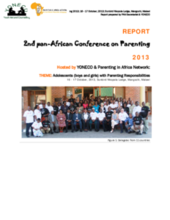The Parenting Africa Network (PAN) in partnership with YONECO (Youth and Net Counseling) hosted the 2nd Pan-African conference on parenting on the 16-17th October 2013 in Malawi. The theme of the conference was 'Understanding realities of teenage parenting: a special focus on adolescents (boys and girls) with parenting responsibilities'. It is estimated thatroughly 11% of all births worldwide are to girls aged 15 to 19. The proportion of births that take place during adolescence is about 2% in China, 18% in Latin America and the Caribbean and more than 50% in Sub-Saharan Africa. The report highlights that the realities of adolescent parents and the reasons for becoming parents at an early age are multiple and a thoughtful approach to the issue is required to listen and understand, with respect to their specific situations. For many adolescents, the responsibility of raising children at an early age is an obstacle to their educational and professional attainment. In addition, there are health risks due to their stage of development.
The conference’s main objective was to highlight these realities and challenges. It provided an opportunity for 69 delegates from 11 countries to share evidence-based knowledge and information to inform advocacy actions. It also sought to clarify understanding around parenting teenagers and collect evidence on efforts and actions to strengthen family relationships for the well-being of children. The report provides synopses of all of the events, keynotes and plenary sessions over the two-day period. It provides summaries of the main talking points of each speaker’s presentations and also highlights questions and answers from those in attendance. The report concludes with the Mangochi Declaration and Plan of Action that highlights steps required to both bring attention to the issues raised and address the gaps. The declaration highlights, among other things, the lack of research on parenting programmes in Africa but also the limited dissemination of information concerning parenting, in terms of both scope and languages. The participants also stressed the need to step up efforts towards the prevention of teenage pregnancy and teenage fatherhood by providing young children with appropriate, reliable and comprehensive information related to reproductive rights and responsibilities, and to train health workers and teachers on how to teach about these subjects. The declaration further underlines the importance of providing support to pregnant teenage mothers and fathers and help them find ways to continue their education, and to ensure that teenage fathers are actively involved in their fatherhood roles.

